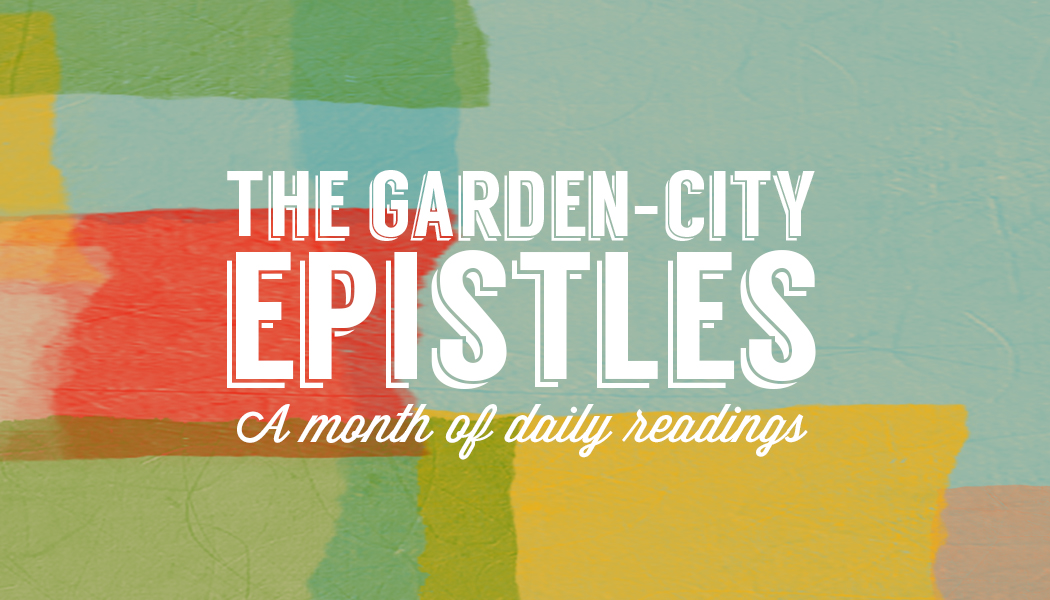I wrote this letter for Ed Cooper, an entrepreneur and businessman at Westwinds who has devoted much of his life to helping young people in their vocational development.
If you want to fully understand the Bible, it helps to play out each scene in your mind as though you’re making your own film. My friend Paul Patton, drama professor at Spring Arbor University, calls it “theatrical hermeneutics” but you can just think of it as imagination.
In the Creation story, God placed humanity within a garden-temple and commanded Adam and Eve to fill the earth and subdue it. Looking out from the hillock of Eden, we must imagine our ancestors realized God’s task would be impossible without help. Moving out of the garden would seem like an unthinkable hardship since the land outside was totally inhospitable to humans.[1] The world is so big and Eden, comparatively, must have felt very small.
But the first portion of God’s command was to “fill” the earth. Adam and Eve were meant to make more adams and more eves. God made the first humans capable of making the rest of the humans, so humans could go on doing the things God required. Adam and Eve didn’t need to do their work alone. Their children were meant to help.
I’m telling you this not only because you’re a parent, but also because you’ve invested so much in your vocational children, the young men and women you taught and into whom you poured your life for many years. I want you to know that neither investment has been wasted, that the good God began in you continues through them, and that your legacy is secured through your commitment to others and to the Lord.
What does all this stuff about Eden have to do with legacy?
Allow me to explain.
My interest in Eden, ironically, originates with an interest in Revelation. Knowing where we end up has made me insatiably curious about where we began. If we cannot connect our origin to our destiny then life will have no shape, no godly trajectory to permit course corrections whenever we go astray.
Our story began in a garden, but it will end in a city.
In Revelation 21 we learn about the New Jerusalem, God’s future redeemed world, depicted as a city. This city is the same “place” as Eden—the river of life and the tree of life make this clear—but it has also been expanded and cultivated into the City of God. Whereas Eden only took up a small piece of earth’s real estate, the New Jerusalem covers the whole earth[2].
What began in a garden ends in a garden-city, and God has entrusted us with taking the world from A to B.
Do you see what this means? As we fill the earth and subdue it, bringing dominion over the living members of Creation, we are civilizing the planet. “The ultimate goal set before humanity,” says pastor-theologian Tim Keller, “…is that there should be an urban structuring of human historical existence.”[3] We are extending the borders of Eden until this one hillock has grown to cover all continents, waterways, and boundaries; until everything is Edenic in the garden-city of God. The perimeter of this garden-city extends over the entire earth, since nothing unclean will be allowed to enter the city.[4] Revelation 20.9-15 tells us every unclean thing has been destroyed in the lake of fire. All we’re meant to conclude here is that nothing unclean can come into the city—not because the city has borders—but because nothing unclean exists any longer.[5] We, like Abraham before us, are looking forward to a city “whose builder and maker is God.”[6]
At this point I can see you looking up from this letter, grinning at me over the top edge of the paper as if to say, “Are you kidding me?” I’m grinning back because, no—I’m not.
God gave us an unfinished Creation, inviting us to cooperate with him in its completion. He gave us a garden but requires a city.
And we cannot live in the city alone. We cannot cultivate this garden-paradise by ourselves. Your investment in other people—both your biological and sociological children—is not merely a good investment, but a divine contribution.
You are making more people like God.
[1] Otherwise how would the garden be distinguishable and what need would there be for subduing and dominion?
[2] In fulfillment of Habakkuk 2.14.
[3]Timothy Keller, “A Biblical Theology of the City,” Evangelicals Now (July 2002): 5, accessed December 17, 2008, http://www.e-n.org.uk/2002/07/features/a-biblical-theology-of-the-city/.
[4] Revelation 21.27.
[5] Beale, The Temple and the Church’s Mission, 24-25.
[6]Hebrews 11.10.
fossores
Related posts
Categories
Category Cloud
Tag Cloud
Recent Posts
- Victors and Victims November 6, 2018
- 3 Hacks for Happiness October 29, 2018
- Hope Against Death September 20, 2018
- The Shape Of The Cross September 19, 2018


